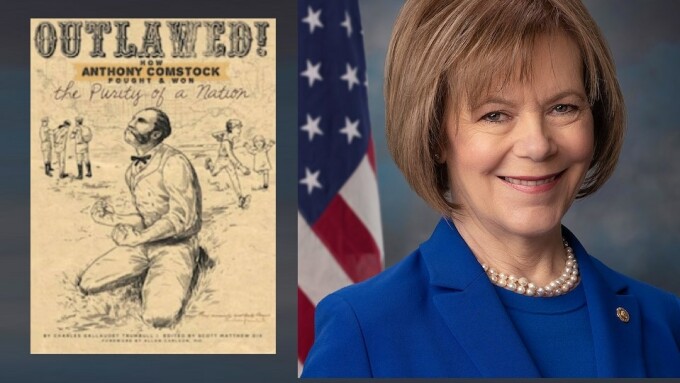WASHINGTON — Democratic U.S. Senator for Minnesota Tina Smith announced on Thursday plans to introduce legislation to repeal language in the Comstock Act — the infamous law that was the cornerstone of U.S. censorship of all sexual material from the 1870s until the 1970s — concerning distribution of material related to abortion and sexual health.
Smith did not reveal during her announcement the actual text of her proposed Stop Comstock Act (SCA), which has been endorsed by other congressional Democrats such as New York Rep. Pat Ryan.
The Thursday announcement did not make it clear whether Smith and her allies plan to repeal all sex censorship provisions in the Comstock Act and related legislation or, as she seemed to specify in the latter part of her statement, only “language in the Comstock Laws that could be used by an anti-abortion administration to ban the mailing of mifepristone and other drugs used in medication abortions, instruments and equipment used in abortions, and educational material related to sexual health.”
Smith described the Comstock Act as “an arcane 1873 law that Republicans and anti-choice extremists want to misuse to ban abortion nationwide.”
As XBIZ reported, concern about clear and present dangers posed by the Comstock Act spiked this spring as conservative Supreme Court Justices Samuel Alito and Clarence Thomas invoked it in oral arguments, echoing the spirit of the Heritage Foundation-led Project 2025’s call for renewing its enforcement. Enforcement of the act’s outdated provisions could result in the total censorship of adult content, along with other sex-related material.
The Comstock Act, as congressional news site The Hill explained in March, “banned the mailing of materials that were deemed ‘obscene, lewd, or lascivious,’ which included things such as contraception, abortion drugs and pornography.”
Legal experts such as University of Michigan professor Leah Litman, the Hill added, “are concerned either Thomas or Alito — or both — could write a Comstock-focused opinion arguing the law is viable. Such an opinion could embolden a future GOP administration and anti-abortion groups to continue pressing forward with plans to enforce the Comstock Act in ways it hasn’t been enforced before.”
Sen. Smith wrote on Thursday, “The Comstock Act is a 150-year-old zombie law banning abortion that’s long been relegated to the dustbin of history. But extremist Republicans and Trump judges have seized upon the idea of misusing Comstock to bypass Congress and strip women nationwide of their reproductive freedoms. When MAGA Republicans say they intend to use the Comstock Act to control women’s decisions and enact a backdoor national abortion ban, we should believe them. Now that Trump has overturned Roe, a future Republican administration could try to misapply this 150-year-old Comstock law to deny American women their rights, even in states where abortion rights are protected by state law.”
Smith added, “It is too dangerous to leave this law on the books; we cannot allow MAGA judges and politicians to control the lives of American women.”
Her office added that these censorship laws originally “meant to ban the mailing or shipping of every obscene, lewd, indecent, article, matter, thing or device, with the goal of restricting abortion, contraceptives, and even love letters,” and noted that “a future administration hostile to sexual and reproductive health care will willfully misapply these unconstitutionally vague laws to impose a ban on abortion nationwide, even without any Congressional action.”








